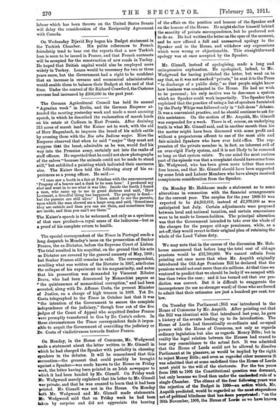Mr. Ginnell, instead of apologising, made a long and unimpressive
explanation. He apologised, indeed, to "Mr. Wedgwood for having published the letter, but went on to say that, as it was not marked "private," he sent it to the Press. "in discharge of a public duty," so that people might know how business was conducted in the House. He had no wish to be personal ; his only motive was to denounce a system which no Speaker could work impartially. The Speaker then explained that the practice of using a list of speakers furnished by the Party Whips was followed only in " full-dress " debates. It was a convenient practice, and he should continue to ask for this assistance. On the motion of Mr. Asquith, Mr. Ginnell was suspended for a week. There is of, course, an underlying truth in what Mr. Ginnell said, and in another mouth than his the matter might have been discussed with some profit and without a preposterous affront to one of the most able and fair-minded Speakers who have ever held office. The sup- pression of the private member is, in fact, an inherent evil of an over-rigid Party system, and it is not likely to be removed so long as that system exists. To our mind the most curious part of the episode was that a complaint should have come from Mr. Wedgwood, who has been given more tether than most free lances, and that Mr. Ginnell should have been supported by some Irish and Labour Members who have always received conspicuous consideration from the Speaker.






































 Previous page
Previous page